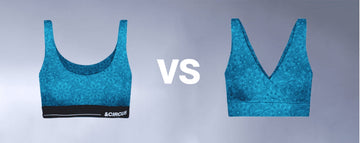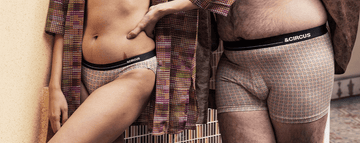Quick Listen:
In the vibrant chaos of a Mumbai morning, where ambition hums alongside the faint dampness of monsoon air, the choice of innerwear feels like a subtle yet profound decision. Across India's urban hubs Maharashtra, Karnataka, Tamil Nadu, Delhi, and beyond consumers are redefining what they expect from the garments closest to their skin. It's no longer just about utility; it's about comfort, freedom, and a commitment to sustainability. At the heart of this shift lies a fabric showdown: traditional cotton versus the sleek, eco-friendly Micromodal. Which one truly delivers for daily wear? Let's dive into the details and uncover why this choice matters.
The Evolution of Everyday Wear
For decades, cotton was the unchallenged king of innerwear breathable, natural, and reliable. But as India's urban centers evolve, so do consumer priorities. From the co-working hubs of Bengaluru to the stylish cafes of Delhi, people want innerwear that balances comfort with sustainability and versatility. Tailor and Circus, a trailblazer in eco-conscious fashion, is leading this charge by championing Micromodal a fabric that feels like a second skin while aligning with modern values.
Innerwear is the foundation of your day, the unsung hero whether you're navigating a corporate meeting in Hyderabad or a yoga session in Chennai. For Gen Z and Millennials in metros like Tamil Nadu and Karnataka, sustainability isn't just a buzzword it's a lifestyle. The fabric you choose reflects not just personal comfort but a broader commitment to the planet.
Decoding the Fabrics: Cotton vs. Micromodal
Cotton has long been a staple, prized for its natural breathability and durability. A 2023 industry report forecasts the global cotton textile market to reach USD 55.04 billion by 2030, growing at a 4.63% CAGR, driven by its widespread use and innovations in blends like linen or spandex for enhanced elasticity and moisture management. Yet, cotton has its downsides: it shrinks, fades, and its water-heavy production process raises concerns for environmentally conscious consumers.
Enter Micromodal, crafted from beech tree pulp. This fabric is a game-changer ultra-soft, moisture-wicking, and naturally stretchy, as highlighted by fabric experts. Unlike cotton, Micromodal absorbs water more efficiently while maintaining breathability, though its higher price point can be a consideration for some. The global modal fiber market, valued at USD 1.2 billion in 2023, is projected to grow to USD 2.1 billion by 2032 at a 6.5% CAGR, fueled by rising demand for biodegradable textiles. Derived from renewable beech trees, Micromodal offers an eco-friendly alternative to synthetic fibers, making it a favorite for brands like Tailor and Circus, whose signature fabric blends prioritize sustainability.
In essence, cotton delivers durability but lacks stretch and can feel heavy when damp. Micromodal, with its silky texture and superior moisture-wicking, shines in humid climates like Kerala or West Bengal, offering a lightweight, sustainable option for urban dwellers.
A Comfort Revolution in Urban India
India's fashion scene is transforming, particularly in Tailor and Circus's key markets Maharashtra, Tamil Nadu, Delhi, Telangana, and beyond. Urban consumers, especially younger demographics, crave innerwear that's fuss-free, gender-agnostic, and effortlessly stylish. Micromodal's smooth, lightweight feel meets these demands, offering a barely there experience perfect for Mumbai's humid commutes or Bengaluru's climate-controlled offices.
Social media is amplifying this trend. Influencers like desouzamesty and theurbandandy are showcasing Micromodal's versatility on platforms like Instagram and Pinterest, resonating with thousands in cities like Gujarat and Haryana. These creators highlight how Tailor and Circus's vibrant, gender-neutral prints cater to a generation that values individuality and ease, making Micromodal a standout in the daily wear game.
Why Micromodal Redefines Daily Comfort
Imagine this: you're working from home in Hyderabad, juggling virtual meetings and tight deadlines. Your innerwear needs to keep pace breathable for long hours, stretchy for quick stretches, and stylish enough to boost your confidence. Micromodal delivers on all fronts. Its moisture-wicking properties make it ideal for active lifestyles, earning praise from athletes and creators like gowrieparvathy. Tailor and Circus's Micromodal innerwear, with its innovative construction and inclusive designs, fits seamlessly into modern routines across Uttar Pradesh, Tamil Nadu, and beyond.
For new parents or those with sensitive skin, Micromodal's hypoallergenic properties are a hidden strength. Unlike cotton, which can trap moisture and cause irritation, Micromodal keeps you dry and comfortable, even in Kerala's sticky summers. This practicality, paired with its eco-friendly credentials, is driving urban consumers to make the switch.
Tackling Doubts with Confidence
Not everyone's sold on Micromodal. In Tier 2 cities like those in Uttar Pradesh, some find its playful designs too youthful. Tailor and Circus addresses this with versatile options think minimalist solids for professionals and bold prints for Delhi's trendsetters. Durability is another concern: can Micromodal endure India's rigorous wash cycles? Lab tests confirm it retains softness and shape longer than cotton, which often pills or fades over time.
The biggest hurdle? Convincing cotton loyalists to switch. Micromodal's blend of comfort, sustainability, and style answers this, with urban consumers in Karnataka and Maharashtra raving about its lightweight feel and eco-conscious appeal. For many, the switch isn't just practical it's a statement of values.
Sustainability as a Business Edge
Micromodal's appeal extends beyond comfort to sustainability. Its production uses less water and energy than cotton, aligning with global environmental goals. Tailor and Circus capitalizes on this, blending Micromodal with innovative, fuss-free designs to create innerwear that's as planet-friendly as it is comfortable. This resonates in markets like Tamil Nadu and West Bengal, where urban consumers are increasingly willing to invest in sustainable options.
The brand's gender-agnostic prints and streamlined construction foster loyalty in a market where 80% of consumers prioritize sustainability, according to industry insights. Still, challenges persist: scaling digital presence on platforms like YouTube and Reddit and convincing cotton-traditional buyers in Tier 2/3 cities remain hurdles. Tailor and Circus's strategic focus on education and accessibility is key to overcoming these.
The Future of Innerwear: Hybrid and Sustainable
The innerwear industry is poised for a hybrid revolution. Experts, as cited in a market analysis, predict blends of Micromodal with fibers like rayon or spandex will lead the charge, offering enhanced performance for active and sensitive-skin consumers. Textile engineers and dermatologists praise Micromodal's skin-friendly properties, positioning it as a frontrunner for India's growing sustainable fashion market, particularly in regions like Telangana and Gujarat.
For Tailor and Circus, this is a chance to pioneer change. By combining Micromodal's eco-friendly edge with innovative designs, the brand is redefining innerwear for a new era one where comfort and consciousness go hand in hand.
A New Standard for Everyday Basics
Micromodal isn't just a fabric; it's a shift in how we think about daily wear. It's about choosing comfort that doesn't compromise, style that doesn't sacrifice, and sustainability that doesn't preach. For urban Indians from Delhi's bustling streets to Kerala's coastal charm Tailor and Circus offers a fresh perspective on the essentials. Why settle for cotton when you can embrace Micromodal? Visit andcircus.com to experience a revolution that's as comfortable as it is conscious.
Frequently Asked Questions
Are there any drawbacks to choosing micromodal over cotton?
Micromodal can be more expensive and may have less durability than high-quality cotton in some cases. However, many brands improve longevity by blending it with elastane or other fibers, striking a balance between softness and durability.
What sustainability advantages does micromodal have over cotton?
Micromodal is made from sustainably harvested beechwood pulp and requires less water and energy to produce than conventional cotton. Its biodegradable and often manufactured using eco-friendly processes, reducing its environmental footprint.
How does micromodal fabric compare to cotton in daily wear comfort?
Micromodal is softer, more breathable, and has better moisture-wicking properties than traditional cotton. Its fine fibers provide a silky feel against the skin, making it ideal for underwear and activewear where comfort and temperature regulation are key.
Disclaimer: The above helpful resources content contains personal opinions and experiences. The information provided is for general knowledge and does not constitute professional advice.
You may also be interested in: Boxers V/S Shorts: Which Is More Comfortable for Men?
Uncomfortable underwear shouldn't steal your confidence. At Andcircus, we craft ultra-soft, sustainable Lenzing Modal Micro innerwear for every body, XS to 5XL. From briefs to bras, our custom packs fit you perfectly. Shop risk-free with our 100% satisfaction guarantee and embrace comfort that includes everyone. #LoveEveryBody. Shop Now!







































